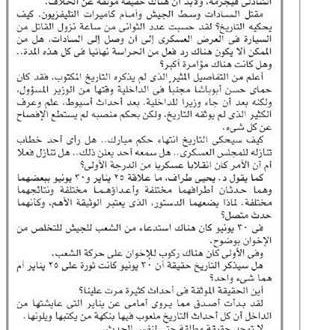Where does the documentation of an event recorded by history come from? Sometimes the same event is narrated by the people who experience it in different aspects and they may differ sharply in narrating it.
Who was responsible for the defeat in 1967, the origin of all suffering experienced by the Middle East until this moment? Was he Gamal Abdel Nasser who declared his responsibility by himself or General Abdel Hakim Amer who was said to have committed suicide?
Were not the two one thing?
The leader admitted his responsibility by himself and we decided to release him of it.
Was not that a regime that ended up with a disaster that caused what we suffer till now?
For example, Saad El Shazly’s situation in October 1973 War.
The story is narrated in two clearly different ways.
The aim of the one that narrates is either to reduce the role of Sadat and accuse him of disloyalty or to reduce the role of El Shazly so as to incriminate him. There must be a documented truth about the difference.
Assassination of Sadat amidst the army and in front of television cameras, how is it narrated by history? I calculated the seconds from the moment that the killer got off the car on the military parade until he reached Sadat. Is it possible that there was no reaction at all from the security guards during all this time? Was there a bigger conspiracy?
I knew interesting details that were not recorded in history. My father-in-law, Hassan Abu Basha was excluded in the interior ministry by the minister in charge at the time, but after he became the interior minister, after the events of Assiut, he learned and knew a lot that was not documented by history. Ex officio, he could not disclose all things.
How will history narrate the end of Mubarak’s rule? Did anyone see his abdication letter to the Military Council? Did anyone hear Mubarak announcing that? Did he actually step down or was it a first degree military coup?
As Dr. Yehia Tarraf said, what is the relation between 25 January and 30 June? They have different parties, different enemies and different results. Why the Constitution, the most important document, does consider them as one connected event?
On 30 June, there was a clear call from the people to the army to get rid of Muslim Brotherhood (MB).
On 25 January, MB took over the rule of Egypt on the shoulders of the people’s movement.
Will history mention the fact that 30 June was a revolution on 25 January or are they one thing?
Where is the documented truth in so many events passed over us?
I began to believe what is told about January, which I experienced from the inside, that all the events of history are filled with the flavor of those who write and color them.
There is no absolute truth even for the same event.
If I tell you the details of events I saw and lived over the six days I spent inside the presidential palace, you would not believe how many things that affected the future of Egypt were managed.
But there is time for everything.
As I was told by one of Britain’s most prominent political leaders after just four months of January 2011, who could have ruled her country, commenting on Americans boycotting me after January and avoiding communicating with me, after they had considered me the voice of reason and wisdom in Mubarak’s regime with much respect which I found to be fake, that my presence at that moment during the events was unsuitable to the plan. She said literally, “You were an aberration in the process.”
I was about to spoil it entirely because I was close to find answers that could bring success to the revolution from one hand, and allow the transfer of power within the constitution, not by handing over the power to the military council which was not constitutional, from the other hand. That led to revocation of the 1971 Constitution, which was made by people, so that the military council continues to have powers that were not granted to it by the 1971 Constitution. All of this led to all deification repercussions and handing over of all powers to the MB.
She told me explicitly that considering your political suggestions, according to which President Mubarak was about to act, could have prevented chaos. Chaos was one of the results required from January revolution. She herself said.
Creative chaos!!! It unfortunately resulted only in collapse to the state and the economy. It fell the community apart socially and culturally.
Dr. Hossam Badrawi
 Dr. Hossam Badrawi Official Website
Dr. Hossam Badrawi Official Website


